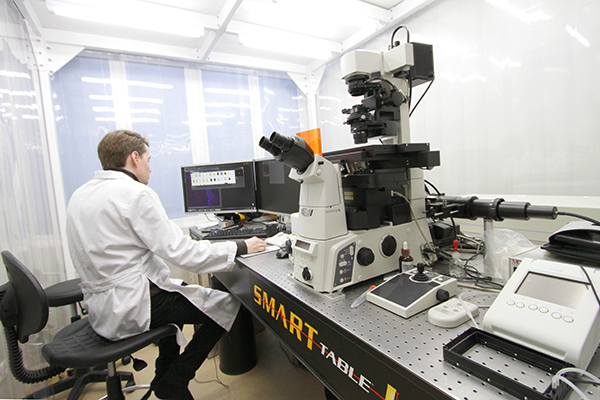

In order to apply to the program, a secondary school diploma or equivalent is required.
Physics, Biology, Russian language
Medical biophysics is the science of physical processes and phenomena occurring in biological systems, primarily in humans, in the normal state and in diseases. Medical biophysics belongs to interdisciplinary fields of knowledge and serves as a link between fundamental biological and medical disciplines and exact sciences.
The main tasks include medical biophysics:
During the first two years future doctors-biochemists study mathematical analysis, probability theory and mathematical statistics, all branches of physics from mechanics to nuclear physics, all branches of chemistry from inorganic chemistry to biochemistry and physical chemistry and biological sciences including general biology, cytology, histology and anatomy. In addition to natural sciences, students are taught philosophy, history, English, Latin. In the third year, along with pharmacology, biochemistry, microbiology, general and medical genetics, students begin to study professional disciplines such as molecular and cellular biophysics, biophysics of organs and tissues and biophysics of pathological processes. Lecture courses are held in parallel with practical classes, where students are taught the basic laws of biophysics and the rules of research work in the laboratory. Starting from the fourth year students are introduced to clinical disciplines such as diagnosis and treatment of internal diseases, experimental and clinical surgery, a set of courses on nervous diseases (neurology, neurosurgery, diagnostics). In addition, students study specialized biomedical disciplines: immunology, clinical laboratory diagnostics, medical biotechnology, radiodiagnosis and therapy, etc. At 6th year all students complete and defend a thesis on research or clinical topics and receive a diploma.
Graduates of the specialty "Medical Biophysics" are in demand in research laboratories, clinical laboratories for functional diagnostics (electroencephalography, ultrasound, computed tomography, MRI studies, etc.) and laboratories of clinical laboratory diagnostics (automated analysis of blood components and cells), as well as at the departments of universities as teachers. According to the legislation, graduates can work in the following medical specialties: radiologist; doctor of clinical laboratory diagnostics; doctor of ultrasound diagnostics.
Many of our graduates work in research and educational organizations in Russia, USA and Europe. The most outstanding graduates have become members of the Russian Academy of Sciences, today they head research institutes, laboratories and departments of universities.
A specialist in medical biophysics does not need to pass exams and obtain additional certificates to work as a researcher or teacher in USA or Europe.
Graduates can continue their education in graduate school in the areas of "Biological sciences" and "Fundamental medicine" and in residency in the areas of "Clinical laboratory diagnostics" and "Radiology”.